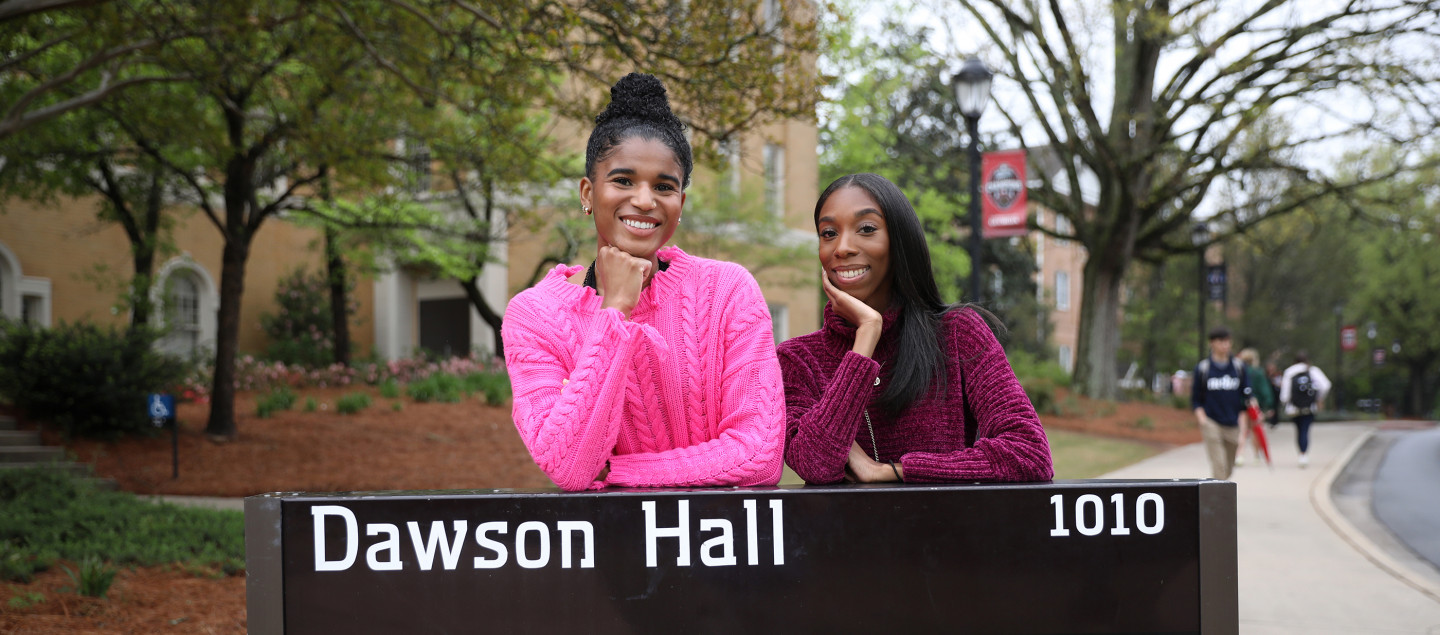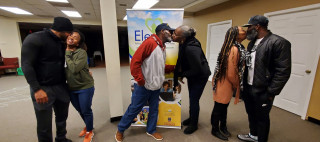Breaking barriers: Child Life classmates lean on each other as program’s first Black students

Over a boxed lunch during a stressful weekend, Aspen Thompson made a new friend.
In Athens to interview for acceptance into the College of Family and Consumer Sciences’ competitive master’s of science in Child Life program last winter, Thompson admitted she was a little “spooked” by the process.
When the candidates met for lunch, Thompson settled into a seat next to JaQuira Wallace. As the two began chatting, a light-hearted exchange marked the beginning of what would become a unique friendship.
“We were joking because she doesn’t like sweets,” Thompson said. “I love sweets, so I traded my fruit for her cookie.”
Thompson and Wallace soon discovered more commonalities.
They both come from military backgrounds. Both of Thompson’s parents were officers in the Navy in California and Texas before retiring to Virginia. Wallace’s father recently retired from a career in the Air Force in South Carolina.
They learned they shared a Christian faith and they both have wrestled with perfectionist tendencies.
Among a few other common threads, Thompson and Wallace also have another obvious connection: they’re both Black students, possibly the program’s first in its 30-year history, pursuing a career as Child Life Specialists where Black practitioners make up just 11 percent of the field nationwide.
“We have a lot of shared passions, dreams, convictions and experiences when it comes to being a Black student in general,” Thompson said. “It’s just another layer of closeness, and it’s easy to feel like we’re collaborating and spurring each other on.”
'I just want to help'
Child Life Specialists serve a unique role in the healthcare field. They typically work in hospitals, supporting the psychosocial needs of children and families to help them understand their illness or injury and develop positive coping skills.
Faculty member Diane Bales, professor and UGA Cooperative Extension human development specialist, directs the FACS program, with clinical assistant professor Stephanie Whitten serving as clinical coordinator.
A recent class focused on death and bereavement in which students were presented the following case study:
“You’ve been working in oncology. When you arrive for work, you find out that a 14-year-old boy you have seen on and off for a year died the night before. You tear up when you see his parents. What do you say and do?”
The students’ discussions covered issues like self-care, establishing professional boundaries and being genuine with children and families.
While acknowledging the heaviness of certain aspects of the job, Wallace said she’s convinced she’s exactly where she’s meant to be.
“It sounds cliché, but I just want to help,” she said. “It’s always been a goal of mine to be an advocate for children any way I can. I want to be that person rooting for them when it feels like they don’t have anybody rooting for them.”
Wallace’s passion for the field grew out of watching her mother’s interactions with kids in her preschool classroom. Later, an advisor in Wallace’s undergraduate program at the College of Charleston recommended Child Life, and Wallace’s path was set.
“I did my research and thought ‘I could really see myself being successful in this field,’ ” she said.
Thompson earned an undergraduate degree in pre-clinical public health at Liberty University, where she also played volleyball, but discovered a passion for Child Life when a family friend’s young son was diagnosed with leukemia.
“His mom just raved about the Child Life specialists on his care team and how it had made such a big difference,” Thompson said. “I had no idea that job had a name, but I really knew that was something I felt called to do and was the sweet spot between my love for medicine and my passion for serving and supporting.”
Their paths converged at UGA, where they joined a small cohort of four first-year students in the rigorous program in which students are required to complete an internship at a hospital and are then eligible to sit for the Child Life Certification Exam.
In short, it’s a lot. Both Wallace and Thompson say they’ve been stretched in the program and lean on each other for comfort and encouragement.
“I firmly believe God put Aspen and me in this program together to develop a friendship and be intentional and talk about our experiences as Black students and Black women, and I really appreciate that,” Wallace said. “I know she will always be there for me.”
A culture of support
Diversifying the field of Child Life is a priority for many programs, including FACS.
According to the careers website Zippia, 60 percent of Certified Child Life Specialists identify as white and 75 percent are women.
Wallace said she has tried to find other Black practitioners on LinkedIn, but has been unsuccessful.
“I’m hoping that’s something that can change,” she said.
Whitten agrees.
“Minority representation in the field of Child Life is vital to diversifying the workforce,” she said. “When children and families see individuals who look like them or share similar backgrounds, they feel more understood and supported, which can positively impact their emotional well-being throughout hospitalization.”
While acknowledging the importance of recognizing the gap for existing practitioners of color, Thompson said one of the strengths of the FACS program is the open atmosphere fostered by Bales and Whitten.
“There are so many people rooting for you here,” Thompson said. “Everybody is invited to share and give perspective without it feeling like you’re being called out or embarrassed.”
Wallace has had a similar experience. She said she’s had encouraging conversations with both Bales and Whitten about the issue and is optimistic about the future based on her experience at UGA.
“I’ve just really felt comfortable here,” she said. “It feels like a family to me.”
In this category: Family
-
Multidisciplinary FACS team receives $6.1 million grant to aid Georgia families
Elevate Couples Georgia team seeks to deliver Healthy Marriage and Relationship Education program to 1,300 couples

-
Kogan recognized for advancing family-centered prevention science
Professor honored by Society of Prevention Research for decades of work related to families

-
Geier named college’s first associate dean for research
HDFS professor will enhance college's research infrastructure

-
Hargrove named assistant director of UGA Love and Money Center
Licensed marriage and family therapist will teach graduate-level courses and lead outreach efforts

-
Lack of sleep disrupts key brain functions in adolescents
More sleep could protect children’s mental health
